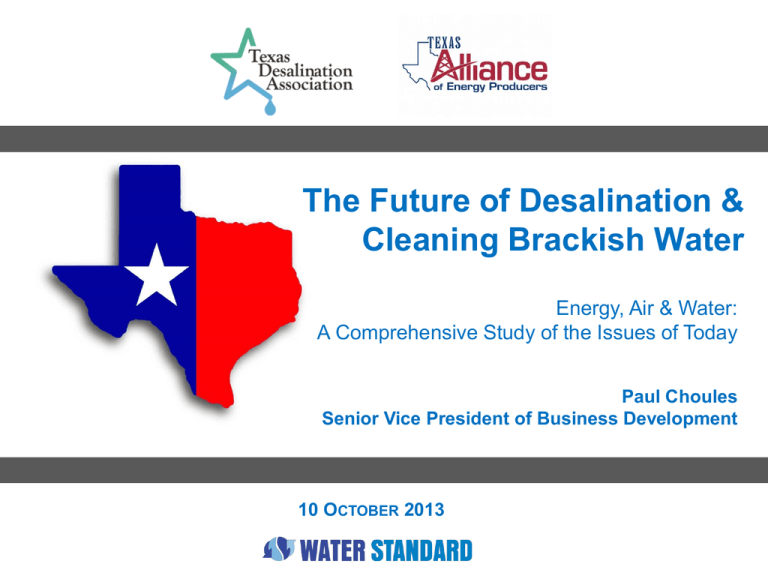
The Future of Desalination &
Cleaning Brackish Water
Energy, Air & Water:
A Comprehensive Study of the Issues of Today
Paul Choules
Senior Vice President of Business Development
10 OCTOBER 2013
TOPICS
•
•
•
•
•
•
•
•
•
•
About Texas Desalination Association
The Demand for Water
Some Water Facts
Desalination, a practical alternative
Desal in Texas
Water Sources
Desalination Defined
Market forecast
Prop 6 – VOTE
Conclusions
WS_TEXAS_ALLIANCE_SAN_ANTONIO_FUTURE_OF_DESAL_BRACKISH
©2013 WATER STANDARD All Rights Reserved
2
About the Texas Desalination Association
The Texas Desalination Association was established in response to:
1. The drought of 2011 and its effects on municipal, agricultural and
industrial water supplies and
2. The water needed to recognize the economic benefits of hydraulic
fracturing in oil and gas production in Texas.
•
Membership is comprised of representatives from the legislature and
academia, regulators, Desal industry insiders, members of the legal
community and state and local municipalities. We have membership from
the oil & gas industry and the power industry, developers, consultants and
contractors touching every aspect of water. Everyone needs water and
our drought proof technology is one of the long term solutions for Texas.
WS_TEXAS_ALLIANCE_SAN_ANTONIO_FUTURE_OF_DESAL_BRACKISH
©2013 WATER STANDARD All Rights Reserved
3
About the Texas Desalination Association
Key Achievements & Milestones:
•
•
•
•
•
•
Consistently working to make regulatory processes more accessible
Educating the public on pertinent water issues
Texas Desal 2013: Opportunities & Obstacles Conference - Exceeded
250 attendees at its first-ever conference; planning for second annual
conference underway
Our most important legislative initiative was an attempt to streamline the
regulatory process in regards to permitting
Our other effort was to support a legislative attempt to encourage “colocating” of Desal and power generation plants
A commitment received from TCEQ officials to undertake rulemaking to
address the current regulatory permitting process
WS_TEXAS_ALLIANCE_SAN_ANTONIO_FUTURE_OF_DESAL_BRACKISH
©2013 WATER STANDARD All Rights Reserved
4
Increased Demand and Need
Competing interests with agriculture, population
growth and industry for a limited unpredictable source
▼Water restrictions have
eliminated about 50,000
acres of the region's
145,000 acres of rice in
Texas (Source: E&E
Publishing).
►Texas population
to more than double
by 2050 (projected to
grow to 41 million).
WS_TEXAS_ALLIANCE_SAN_ANTONIO_FUTURE_OF_DESAL_BRACKISH
©2013 WATER STANDARD All Rights Reserved
◄The US is on its way to
become energy
independent currently
leading the world in oil and
gas production.
▲78 percent of the
state is in exceptional
drought, the worst
category possible.
5
Needs Relative To Projected Demands
Largest Cities
in Texas are
among the
Top 20 Largest
in the US:
Houston
Dallas
San
Antonio
Austin
El Paso
Limited source
Unlimited source
Gulf of Mexico
WS_TEXAS_ALLIANCE_SAN_ANTONIO_FUTURE_OF_DESAL_BRACKISH
©2013 WATER STANDARD All Rights Reserved
6
Water, The Facts
Houston:
•
•
•
Industrial: $4.74/1,000 gallons
Commercial: $4.74/1,000 gallons
Residential Single Family: $4.46/1,000
gallons
San Antonio:
•
•
•
Industrial: $1.15/1,000 gallons
Commercial: $1.15/1,000 gallons
Industrial: $5.80/1,000 gallons
Commercial: $5.80/1,000 gallons
Residential: $3.96/1,000 gallons
Las Vegas:
•
•
•
•
•
•
Industrial: $2.08/1,000 gallons
Commercial: $1.16/1,000 gallons
Industrial: $5.17/1,000 gallons
Commercial: $5.17/1,000 gallons
Residential: $4.17/1,000 gallons
Austin:
•
•
•
Residential: $0.948/1,000 gallons
Los Angeles:
•
•
•
Corpus Christi:
Industrial: $4.69/1,000 gallons
Commercial: $4.69/1,000 gallons
Residential Single Family: $1.172/ 1,000
gallons
Phoenix
•
•
•
Industrial: $7.77/1,000 gallons
Commercial: $7.77/1,000 gallons
Residential: $4.49/1,000 gallons
Prices are rising across all
major cities and sectors
Residential: $1.16/1,000 gallons
Source: Austintexas.gov
WS_TEXAS_ALLIANCE_SAN_ANTONIO_FUTURE_OF_DESAL_BRACKISH
©2013 WATER STANDARD All Rights Reserved
7
Four Sources
Additional water supply for increasing demand can only be obtained
through four (4) basic sources:
Finding
Additional
Traditional
Sources of
Supply:
Rainwater
Catchment,
Aquifers, Rivers
and
Lakes/Dams
Conservation
WS_TEXAS_ALLIANCE_SAN_ANTONIO_FUTURE_OF_DESAL_BRACKISH
©2013 WATER STANDARD All Rights Reserved
Reuse
(Wastewater / Produced
Water Reuse)
Desalination
Desalination: A Practical Alternative
•
•
The cost variance to treat freshwater and brackish groundwater will
undoubtedly converge, particularly if Texas continues to experience
intense drought. As our freshwater reserves become more stressed, the
demand for freshwater will drive the cost up, making desalination more
attractive.
Desalination of brackish groundwater is slowly but surely becoming a
more competitive and practical alternative for meeting water demands in
Texas.
WS_TEXAS_ALLIANCE_SAN_ANTONIO_FUTURE_OF_DESAL_BRACKISH
©2013 WATER STANDARD All Rights Reserved
9
Desalination in Texas
El Paso is the site of one of the world's
largest inland desalination plant. A joint
project of El Paso Water Utilities and Ft.
Bliss, the Kay Bailey Hutchison Desalination
Plant produces 27.5 million gallons of fresh
water daily (MGD) making it a critical
component of the region's water portfolio.
Using a previously unusable brackish
groundwater supply, the Kay Bailey
Hutchison Desalination Plant is creating a
new supply of water - water from water.
WS_TEXAS_ALLIANCE_SAN_ANTONIO_FUTURE_OF_DESAL_BRACKISH
©2013 WATER STANDARD All Rights Reserved
On June 21, 1961,
President Kennedy
pressed a button in the
White House, signaling
the start-up of the first
of the five demo plants,
noting, “[Desal]
represents a triumph of
peace and not war.”
How and Why?
•Reliable and cost-effective
water treatment tool
•Over 11 Billion GPD of
reverse osmosis (RO) and
electrodialysis (ED/R)
capacity installed in
desalination facilities
around the world
•Over 5 Billion GPD of
membrane filtration
installation capacity
Examples - London, Sydney, Barcelona,
Tampa Bay, Perth, Jeddah, Singapore, El
Paso, etc
WS_TEXAS_ALLIANCE_SAN_ANTONIO_FUTURE_OF_DESAL_BRACKISH
Source: GWI
©2013 WATER STANDARD All Rights Reserved
Water Sources Defined
1) Brackish water is defined as water that is “distastefully salty” but
significantly less salty than seawater. Brackish water can be found
in surface water settings such as estuaries or ground water
settings such as aquifers. Brackish water differs from seawater
because brackish water has a lower salt content. Thus, it requires
less energy and costs less to desalinate via reverse osmosis
2) Re-use: Re-Use can help supplement your municipality's scarce
water stores while providing a maintainable reserve for
agriculture, irrigation and industrial operations
3) Produced Water (PW): Globally for each barrel of oil produced,
three barrels of ‘contaminated’ water is also produced (3:1). In the
U.S. the ratio is closer to 1:7
4) Seawater: Seawater desalination is an alluring adaptation
strategy because it could provide a reliable, drought-resistant
water supply
WS_TEXAS_ALLIANCE_SAN_ANTONIO_FUTURE_OF_DESAL_BRACKISH
©2013 WATER STANDARD All Rights Reserved
12
Source Water Quality
Source: Water Reuse Association
WS_TEXAS_ALLIANCE_SAN_ANTONIO_FUTURE_OF_DESAL_BRACKISH
©2013 WATER STANDARD All Rights Reserved
13
What is Desalination?
•
Desalination is removing the majority of salt from salty water. It achieves
this by pushing water through a membrane that acts as a sieve of sorts.
Larger components like salt and bacteria are too large to pass through
the membrane while the smaller water molecules pass through. The
process effectively separates water from larger components and
contaminants resulting in potable drinking water.
Source Water
Source: Seawater Desalination Feasibility Study, 2007
WS_TEXAS_ALLIANCE_SAN_ANTONIO_FUTURE_OF_DESAL_BRACKISH
©2013 WATER STANDARD All Rights Reserved
14
Thermal
• The thermal
desalination process
is based on
evaporation and the
subsequent
condensation of the
steam
WS_TEXAS_ALLIANCE_SAN_ANTONIO_FUTURE_OF_DESAL_BRACKISH
©2013 WATER STANDARD All Rights Reserved
15
Membrane Technology for Oil & Gas
•
Filtration used to remove Total Suspended Solids (TSS)
• Reduced pressure membrane technologies such as Membrane
Filtration (MF) (micro- and ultrafiltration) are used for TSS removal –
next generation of filtration
•
Pressurized membrane technologies such as Reverse Osmosis (RO)
and Nanofiltration (NF) used for salt and hardness removal
• Seawater-based waterflooding
• Sulphate Removal Processes (SRP)
•
Produced water treatment uses combination of oil/water separation
technologies followed by filtration (generally for other applications)
•
Deaeration to prevent biogrowth – vacuum towers, Miox
• Next generation using membrane deoxygenation
Water Standard has pioneered the use of membranes for desalination
and can fine-tune the salinity and water composition as needed.
WS_TEXAS_ALLIANCE_SAN_ANTONIO_FUTURE_OF_DESAL_BRACKISH
©2013 WATER STANDARD All Rights Reserved
16
What Is A Membrane?
• Extremely thin separating layer that allows some things
to pass while keeping others out
• Some familiar examples:
• Skin
• Cell coverings
• Saran Wrap
• Microfiltration
Cryptosporidium
oocyst on MF
membrane
WS_TEXAS_ALLIANCE_SAN_ANTONIO_FUTURE_OF_DESAL_BRACKISH
©2013 WATER STANDARD All Rights Reserved
17
Benefits of Membrane Use
•
•
Compact and Modular Design
Improved Performance
• Suspended solids content
• Reduced biological counts
• Improved NF/RO performance
•
Minimal Energy Requirements
• Competitive with conventional designs
•
Low Environmental Impact
• Fewer chemicals required
• Innocuous waste (90-99% recovery)
•
Enables Efficiency Throughout Facility
•
•
•
•
•
•
Fewer NF/RO cleanings - lower operating cost
Lower NF/RO pressure drops from fouling - lower energy cost
Lower operations requirement due to complete automation
Greater plant availability related to decreased NF/RO cleanings
Longer NF/RO membrane life
Lower chemical and sludge handling cost
WS_TEXAS_ALLIANCE_SAN_ANTONIO_FUTURE_OF_DESAL_BRACKISH
©2013 WATER STANDARD All Rights Reserved
18
Market Forecast
WS_TEXAS_ALLIANCE_SAN_ANTONIO_FUTURE_OF_DESAL_BRACKISH
©2013 WATER STANDARD All Rights Reserved
19
The State Water Plan: The Texas Drought Connection
The State Water Plan is designed to meet water needs during times of drought.
Its purpose is to ensure that cities, rural communities, farms, ranches,
businesses, and industries have enough water during a repeat of the 1950s
drought conditions.
WS_TEXAS_ALLIANCE_SAN_ANTONIO_FUTURE_OF_DESAL_BRACKISH
©2013 WATER STANDARD All Rights Reserved
20
What’s Next for Water?
Prop 6
•
•
•
Texas does not have a dedicated funding source for water infrastructure to
support the anticipated future rise in public demand on the water supply
Long-term drought conditions could start costing Texas jobs—and money—if
state voters do not pass a $2 billion water referendum this November
If voters approve funding in November, the new accounts would be used to
give out low-interest loans for regional water projects in Texas.
NOVEMBER 4, 2013
WS_TEXAS_ALLIANCE_SAN_ANTONIO_FUTURE_OF_DESAL_BRACKISH
©2013 WATER STANDARD All Rights Reserved
21
Conclusions
• Tailoring water qualities to minimize waste and squeeze the most
out of every drop
• Making desalination and other treatment processes an integral part
of the overall water solution
• Focusing on minimizing the water and chemicals needed for waterbased EOR given cost and scarcity concerns
• Providing specific water qualities for the produced water cycle
• Working to develop cost-effective treatment and reuse solutions
WS_TEXAS_ALLIANCE_SAN_ANTONIO_FUTURE_OF_DESAL_BRACKISH
©2013 WATER STANDARD All Rights Reserved
22
FOR MORE INFORMATION CONTACT
Paul Choules
SVP, Business Development
pchoules@waterstandard.com
Executive Office:
4265 San Felipe, Suite 620
Houston, Texas USA 77027
+1-713-400-4777
www.waterstandard.com
WS_TEXAS_ALLIANCE_SAN_ANTONIO_FUTURE_OF_DESAL_BRACKISH
©2013 WATER STANDARD All Rights Reserved
23







